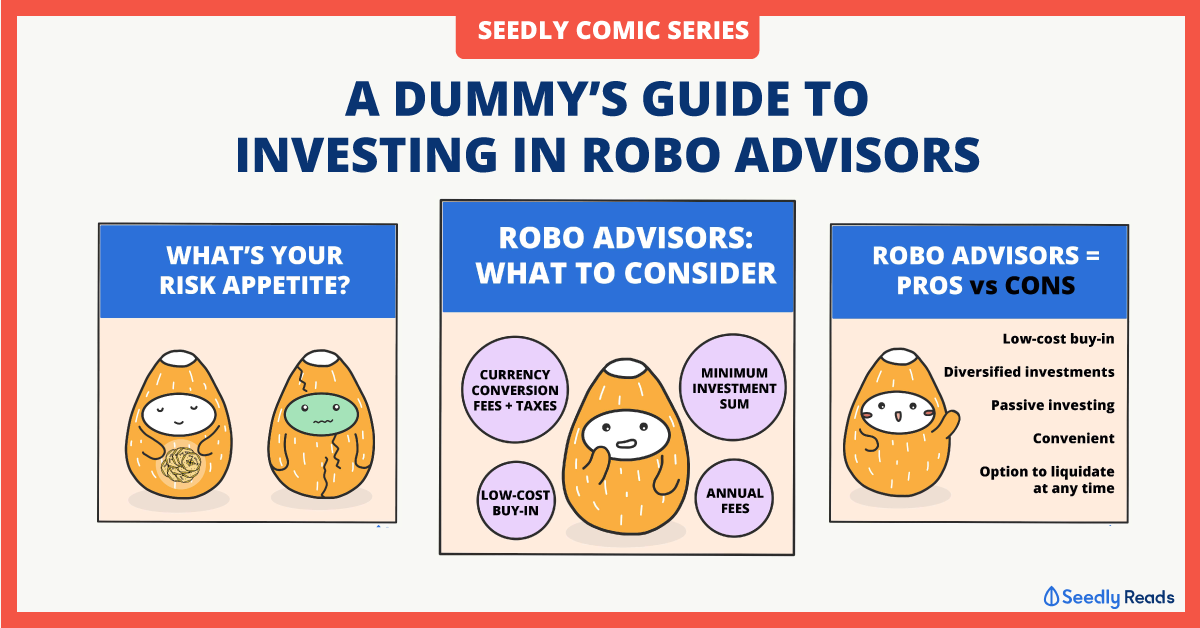This is more for equity investments and less so about ETF investing
Read & listen, observe & question and then do.
The beauty of a robo advisor is that you don't exactly need to do any of those things - you just click and forget that you have some money stashed away (pun-intended).
I think the first concrete step is to read (and listen concurrently) to how great investors invest. For example, learning about how Howard Marks (through his memo) sees the market might be a great place to start (google search and find his memos it dates back to the early 1990s). Through reading and listening, you can see and hear how these greats think. Another great tool is listening to various podcasts that exist outside to just hear about the various ways people think about this elusive conundrum that is the stock markets. Highly suggest, the investor's podcast and the motley fool series. Of course, during this period of time it will be great to learn how to do your financial modelling and pick up ways to learn how to value an asset (Aswath Damodaran has a free course on Youtube).
After reading and listening, now you observe and question. I don't just mean observe by staring at charts and graphs. Instead, looking to the world and reading the news and observing what's going on. Start building that desirable second-level thinking (im still trying to grasp it), ask yourself what does one event or phenomenon mean? How will the current US-Sino tensions playout? What industries can be affected? What commodities are reliant on these trade agreements? Start building the ability to think not just on a surface level but the ability to think deeper. The importance of this step is to prevent you from falling into a fomo (fear of missing out) trap and losing all your money because this elusive second level thinking was not used.
Now you are here, do. Do what? try your hand at investing, I am not going to say how much you should allocate to safer assets and riskier assets. But it doesn't hurt to now test our your thesis that you are comfortable with because after the previous steps you know the following:
You know how to think like an investor (not trader but investor)
You can ask the right questions and know how to find the right answers
You have the skillset required to justify your actions
You won't fall into the FOMO trap
Hope this was somewhat useful, I am still finding my path but at least these are a few things I have tried to do.













This is more for equity investments and less so about ETF investing
Read & listen, observe & question and then do.
The beauty of a robo advisor is that you don't exactly need to do any of those things - you just click and forget that you have some money stashed away (pun-intended).
I think the first concrete step is to read (and listen concurrently) to how great investors invest. For example, learning about how Howard Marks (through his memo) sees the market might be a great place to start (google search and find his memos it dates back to the early 1990s). Through reading and listening, you can see and hear how these greats think. Another great tool is listening to various podcasts that exist outside to just hear about the various ways people think about this elusive conundrum that is the stock markets. Highly suggest, the investor's podcast and the motley fool series. Of course, during this period of time it will be great to learn how to do your financial modelling and pick up ways to learn how to value an asset (Aswath Damodaran has a free course on Youtube).
After reading and listening, now you observe and question. I don't just mean observe by staring at charts and graphs. Instead, looking to the world and reading the news and observing what's going on. Start building that desirable second-level thinking (im still trying to grasp it), ask yourself what does one event or phenomenon mean? How will the current US-Sino tensions playout? What industries can be affected? What commodities are reliant on these trade agreements? Start building the ability to think not just on a surface level but the ability to think deeper. The importance of this step is to prevent you from falling into a fomo (fear of missing out) trap and losing all your money because this elusive second level thinking was not used.
Now you are here, do. Do what? try your hand at investing, I am not going to say how much you should allocate to safer assets and riskier assets. But it doesn't hurt to now test our your thesis that you are comfortable with because after the previous steps you know the following:
You know how to think like an investor (not trader but investor)
You can ask the right questions and know how to find the right answers
You have the skillset required to justify your actions
You won't fall into the FOMO trap
Hope this was somewhat useful, I am still finding my path but at least these are a few things I have tried to do.